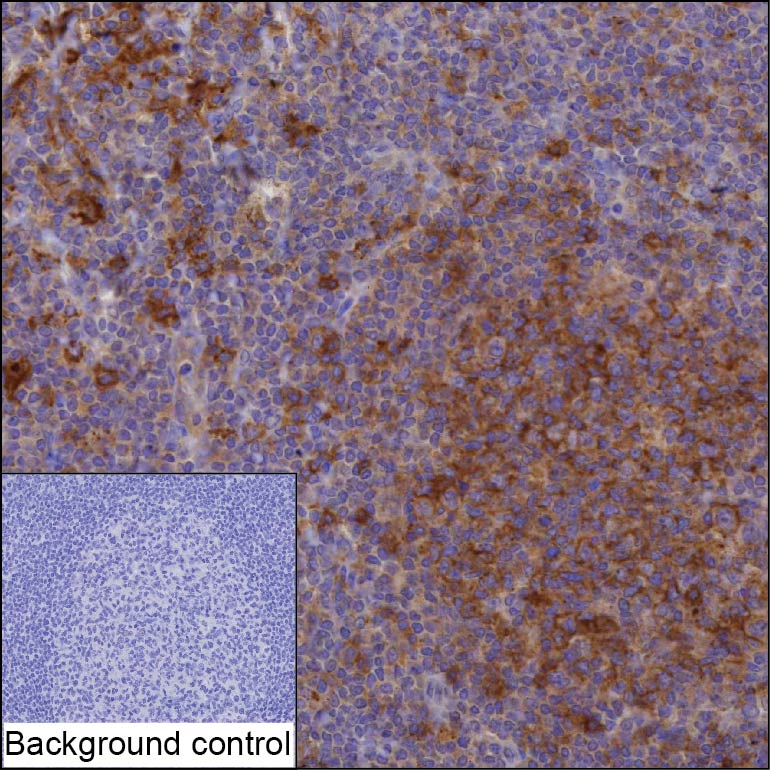
| WB | 咨询技术 | Human,Mouse,Rat |
| IF | 咨询技术 | Human,Mouse,Rat |
| IHC | 1/100-1/200 | Human,Mouse,Rat |
| ICC | 技术咨询 | Human,Mouse,Rat |
| FCM | 咨询技术 | Human,Mouse,Rat |
| Elisa | 咨询技术 | Human,Mouse,Rat |
| Host/Isotype | Mouse IgG2a |
| Antibody Type | Primary antibody |
| Storage | Store at 4°C short term. Aliquot and store at -20°C long term. Avoid freeze/thaw cycles. |
| Species Reactivity | Human |
| Immunogen | Purified recombinant fragment of human PAG1 |
| Formulation | Purified antibody in PBS with 0.05% sodium azide |
+ +
以下是3篇涉及PAG1抗体的研究文献及其简要摘要:
---
1. **文献名称**: *PAG1 regulates TCR signaling by preventing aberrant activation of Lck*
**作者**: Torgersen, K.M. et al.
**摘要**: 本研究利用PAG1特异性抗体,通过免疫印迹和共聚焦显微技术,发现PAG1通过抑制Lck激酶的异常磷酸化来维持T细胞受体(TCR)信号平衡,揭示其在自身免疫疾病中的潜在调控机制。
---
2. **文献名称**: *Phosphoproteomic analysis identifies PAG1 as a novel substrate of tyrosine phosphatase SHP-2 in breast cancer*
**作者**: Li, Y. et al.
**摘要**: 通过免疫沉淀结合质谱分析,使用PAG1抗体验证了其在乳腺癌细胞中与SHP-2磷酸酶的相互作用,表明PAG1的磷酸化状态影响ErbB信号通路,可能成为治疗靶点。
---
3. **文献名称**: *Altered expression of PAG1 in chronic lymphocytic leukemia modulates B-cell receptor signaling*
**作者**: Vázquez, M.N. et al.
**摘要**: 采用PAG1抗体进行流式细胞术和组织芯片分析,发现慢性淋巴细胞白血病(CLL)中PAG1表达下调导致B细胞受体(BCR)信号过度激活,提示其作为疾病预后标志物的可能性。
---
如需具体文献来源或更多研究,建议通过PubMed或Web of Science以关键词“PAG1 antibody”或“PAG1 immune localization”进一步检索。
The PAG1 (Phosphoprotein Associated with Glycosphingolipid-enriched microdomains 1) antibody is a tool used to study the PAG1 protein, a transmembrane adaptor protein implicated in cellular signaling regulation. PAG1. also known as Csk-binding protein (Cbp), is enriched in lipid rafts and serves as a scaffold to recruit signaling molecules, particularly in immune cells. It interacts with C-terminal Src kinase (Csk), which inhibits Src family kinases (SFKs) by phosphorylating their inhibitory tyrosine residues. This mechanism modulates T-cell receptor (TCR) and B-cell receptor (BCR) signaling, maintaining immune homeostasis by balancing activation and inhibition.
Research using PAG1 antibodies has revealed its dual role in cancer and autoimmune diseases. In some cancers, PAG1 overexpression suppresses SFK activity, potentially inhibiting metastasis, while its downregulation may enhance oncogenic signaling. Conversely, in autoimmune disorders like multiple sclerosis, reduced PAG1 expression correlates with hyperactive T-cell responses. Antibodies against PAG1 enable detection of its expression patterns, post-translational modifications (e.g., phosphorylation), and interactions in pathways involving SFKs, Csk, or ubiquitin ligases. Commercial PAG1 antibodies are widely used in Western blotting, immunohistochemistry, and co-immunoprecipitation studies. However, researchers must validate antibody specificity due to potential cross-reactivity with homologous proteins. Ongoing studies explore PAG1's therapeutic potential as a biomarker or target in immune regulation and cancer.
×